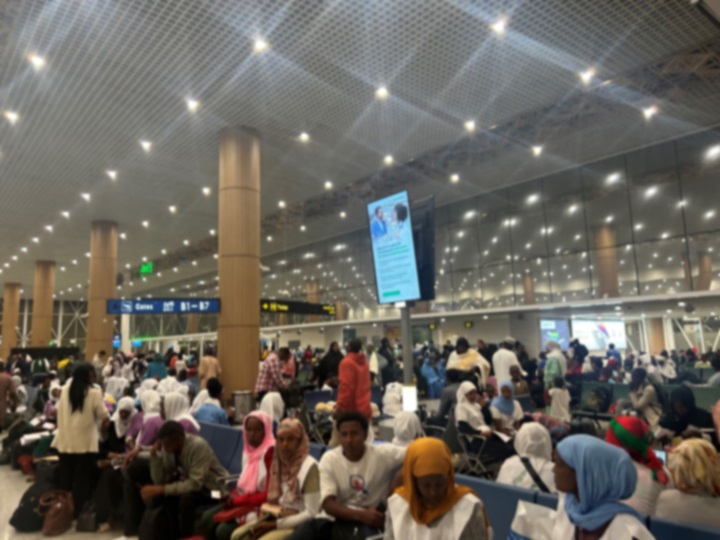Knowledge Forum: Reconceptualizing “Human Mobility” from a Human Security Perspective: What is “Safe and Secure” Corridors for All? What is Japan’s Role?
Day:2025.05.16
event |

This event has ended. Click here to read the event report (with video).
Due to wars, political instability, climate change and economic disparity, the world is seeing human mobility on an unprecedented large scale. Recognizing this, the New York Declaration for Refugees and Migrants, adopted by the General Assembly of the United Nations (UN) in 2016, sets out a framework for the better protection of refugees and migrants.
Japanese society is also going through change: it is currently entering a new phase where human mobility and population-structure changes are progressing simultaneously. The number of foreign residents in Japan is approximately 3.58 million today and we are seeing a record-high year after year. Furthermore, it is predicted that in 2040, Japan will require 6.88 million foreign workers but will be short of them by 970 thousand. Today, more than 80% of foreign workers in Japan are from Asia, but the possibility of receiving diverse human resources from across the globe will come into view in the near future. The UN forecasts that the global working population will increase by approximately 1.5 billion between 2010 and 2050, and of this increase, 1 billion will be from the African continent. As such, the importance of understanding human mobility from perspectives of economic and social development increases even more, and we at the JICA Ogata Research Institute continue to explore how movement corridors that are safe for refugees, migrants and those involved with them can be realized, enabling human mobility as it should be.
In recent years, human mobility beyond national borders has often been discussed from the perspective of the supply and demand of skills. As such, selective migration policies based on the skills of the migrants have been introduced in many migrant-receiving countries. This has “commoditized” migrants and migrant-sending countries are pursuing policies to add “value” to their nationals in terms of skills, such as by offering skill training and making qualification requirements stricter. In this forum, however, human mobility will not be seen as a simple trade of skills. Rather, it will be recaptured from the perspective of human security as a means to realize a society that enables everyone to live with dignity.
In addition to projects on human mobility that JICA is working on, this forum will also explore the initiatives of the United Nations High Commissioner for Refugees (UNHCR), providing international protection and support for refugees, and thethe International Organization for Migration (IOM), intergovernmental organization within the UN system, dedicated to promoting humane and orderly migration. During the discussion session, the following experts will join for a concrete discussion on safe movement corridors: Hein de Haas, a leading authority of migration studies using the aspiration-capability framework to understand migration from the human perspective; Valerie Svobodova, chief of the newly established Asylum and Migration Section, Division of International Protection, Policy and Law Service at UNHCR, which take initiatives on mixed migration; Laura Nistri, who provides overall management of the IOM’s Displacement Tracking Matrix (DTM), which comprehensively tracks and monitors human-movement flow and the status of refugee evacuation around the world; Gracia Liu-Farrer, Waseda University, who is an expert of human mobility in Asia; and Sasaki Shoko, who was the first Commissioner of the Immigration Services Agency of Japan. As both Japan and the world are going through a transition phase today, together with the audience, we hope we can explore the direction that Japan should head toward from here onward.
On the day before (Thursday, June 12), the IPSS Annual Seminar of the National Institute of Population and Social Security Research (IPSS) and the Development Cooperation Seminar of the JICA Ogata Research Institute will be merged and jointly hosted as an event titled “Reimagining Migration Policy: Towards a New Vision for the Age of Fragmentation
.” Please join us in this seminar as well.
14:00–14:05 (5 mins) Opening Remarks
・Kamei Haruko
, Director General, JICA Ogata Sadako Research Institute for Peace and Development
14:05–14:10 (5 mins) Event Outline
・Saito Kiyoko
, Senior Research Fellow, JICA Ogata Sadako Research Institute for Peace and Development
14:10–14:20 (10 mins) Question 1: Initiatives on mixed migration
・Valerie Svobodova, Chief of Asylum and Migration Section, Division of International Protection, Policy and Law Service, The office of the United Nations High Commissioner for Refugees (UNHCR)
14:20–14:30 (10 mins) Question 2: Migration Routes and Migrants
・Laura Nistri, Displacement Tracking Matrix Global Coordinator, International Organization for Migration (IOM)
14:30–14:40 (10 mins) Question 3: Skills and Migrants
・Saito Kiyoko, Senior Research Fellow, JICA Ogata Sadako Research Institute for Peace and Development
14:40–14:50 (10 mins) Reaction to the Questions Raised
・Hein de Haas, Professor, University of Amsterdam
14:50–15:00 (10 mins) Reaction to the Questions Raised
・Gracia Liu-Farrer, Professor, Graduate School of Asia-Pacific Studies, and Director, Institute of Asian Migrations, both at Waseda University
15:00–16:00 (60 mins) Discussion and Q&A
Moderator
・Saito Kiyoko, Senior Research Fellow, JICA Ogata Sadako Research Institute for Peace and Development
Panelists
・Valerie Svobodova, Chief of Asylum and Migration Section, Division of International Protection, Policy and Law Service, The office of the United Nations High Commissioner for Refugees (UNHCR)
・Gracia Liu-Farrer, Professor, Graduate School of Asia-Pacific Studies, and Director, Institute of Asian Migrations, both at Waseda University
・Sasaki Shoko, Executive Director, Japan Immigration Association (former Commissioner of the Immigration Services Agency of Japan)
・Hein de Haas, Professor, University of Amsterdam
・Laura Nistri, Displacement Tracking Matrix Global Coordinator, International Organization for Migration (IOM)
・Orita (Hobo) Tomomi
, Principal Research Fellow, JICA Ogata Sadako Research Institute for Peace and Development
Please register by clicking here
.
*Registration will be closed at noon June 12 (Japan time).
JICA Ogata Sadako Research Institute for Peace and Development (Mr.Takeuchi, Ms. Kajino)
E-mail:dritrp@jica.go.jp
scroll